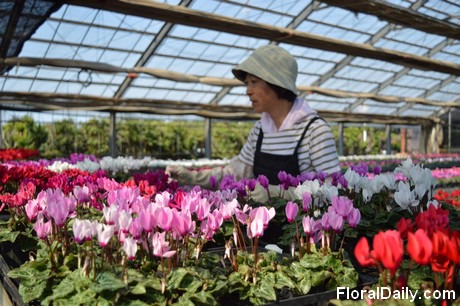
Photo taken at Ito Greenhouse, a friend of Oshio, who also grows cyclamen.
Botrytis
The temperatures are too high for the time of year in Japan. "Normally, we have a cold winter with a dry wind that comes from Russia. This year however, the wind comes from the Pacific Ocean. This wind is warmer and contains a higher level of humidity," explains Oshio. As a consequence, this high level of humidity is affecting the quality of the cyclamen. "Cyclamen do not like humidity, it causes botrytis," says Oshio.
Lower sales
These weather conditions also result in lower sales. "The cyclamen is a typical winter item. However, due to the 'good' weather people are not thinking about this product yet, so they are not buying them," says Oshio. And the low quality of the cyclamen makes the sales decrease even further. Oshio: "Traditionally speaking, during this time of the year, the cyclamen is used as a gift item to thank someone for the past year. Therefore, the appearance is very important. People like cyclamen with hard leaves. However, as, many cyclamen are affected by botrytis, the leaves get softer, which makes them less demanded. Consequently, many people will look for other gift items."
Lower prices
As the sales are usually reaching their peak at this moment, the cyclamen at the Japanese growers are in full bloom and are being shipped on a daily basis. As the demand is low, there is an oversupply of cyclamen which results in lower prices. "The wholesale price for an average 15cm pot cyclamen is like 30 to 50 percent lower than it should be," says Oshio.
Better next week
According to Oshio, it will be better next week. "Looking at the forecasts, it will be colder next week. Hopefully then, the sales will increase again," he says.
